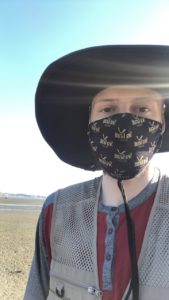 Meet one of our North Sound Stewards community science volunteers of the quarter, Cameron Sokoloski!
Meet one of our North Sound Stewards community science volunteers of the quarter, Cameron Sokoloski!
Tell us about yourself! What are a few things you like to do?
When I’m not at work, I love to mix music at home! My roommate and I recently bought new turntables and we spend our weekends DJ-ing for our friends. It has proven to be such a fun and unique way to stay connected to all our friends that we can’t see in person. Aside from mixing, I love to play video games and spend time at the beach! At this point, I’d like to say I’m a regular at Teddy Bear Cove and Chuckanut Bay.
What inspired you to join North Sound Stewards?
I was inspired to join North Sound Stewards after I saw an announcement that they were looking for volunteers. I had recently graduated from Western Washington University and was looking for a way to get involved in my community, so I immediately jumped at the opportunity to participate in community science!
What has been the most fun, memorable, or impactful experience you’ve had as a North Sound Steward?
I would say it has been meeting people and traveling to places I would not normally visit. For example, I don’t normally travel north to Drayton Harbor, but through North Sound Stewards I was able to see new shorelines and bond with new people over a shared love of the sea.
Through North Sound Stewards I was able to see new shorelines and bond with new people over a shared love of the sea.
Which of the community science programs are you a part of and what are some ways you participate?
I participate in European Green Crab removal all throughout the Northern Puget Sound. While my main site is removal in Drayton Harbor, I have helped out other teams in Chuckanut Bay and Padilla Bay. By filling in and helping out other teams, I was able to experience more shorelines, see different sea critters, and connect with even more wonderful stewards. When I’m not actively out in the field, I’m organizing data and photos from the site — marine science doesn’t end when you leave the beach!
If you had one thing to tell others about community science, what would it be?
For anyone on the fence about participating in community science, do it! Even if you feel like you can’t do a whole lot, every little bit helps. There are so many data gaps in the realm of marine science that even just getting down to the beach and documenting what you see with apps like iNaturalist can be a huge help. Also, everyone is extremely kind and respectful, so if you have any sort of question, it’s easy to ask. Part of the reason we participate in community science is to educate and inform our communities about exciting discoveries or potential issues.
How do you hope people will stay connected with protecting our waters during this time?
During this period of stressful separation, our waters provide safe activities that can give you an opportunity to see others in person. A simple beach cleanup walk with a friend can provide that much needed socializing AND protect our waters! Every little bit helps keep our shorelines the best in the world, and I hope that even during difficult times, the shared love for the sea can keep people together.
